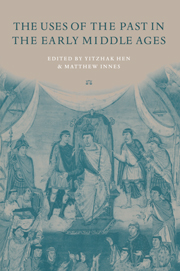Book contents
- Frontmatter
- Contents
- List of contributors
- Acknowledgements
- List of abbreviations
- Introduction: using the past, interpreting the present, influencing the future
- 1 Memory, identity and power in Lombard Italy
- 2 Memory and narrative in the cult of early Anglo-Saxon saints
- 3 The uses of the Old Testament in early medieval canon law: the Collectio Vetus Gallica and the Collectio Hibernensis
- 4 The transmission of tradition: Gregorian influence and innovation in eighth-century Italian monasticism
- 5 The world and its past as Christian allegory in the early Middle Ages
- 6 The Franks as the New Israel? Education for an identity from Pippin to Charlemagne
- 7 Political ideology in Carolingian historiography
- 8 The Annals of Metz and the Merovingian past
- 9 The empire as ecclesia: Hrabanus Maurus and biblical historia for rulers
- 10 Teutons or Trojans? The Carolingians and the Germanic Past
- 11 A man for all seasons: Pacificus of Verona and the creation of a local Carolingian past
- APPENDIX: The Memorial to Pacificus of Verona
- Index
8 - The Annals of Metz and the Merovingian past
Published online by Cambridge University Press: 14 August 2009
- Frontmatter
- Contents
- List of contributors
- Acknowledgements
- List of abbreviations
- Introduction: using the past, interpreting the present, influencing the future
- 1 Memory, identity and power in Lombard Italy
- 2 Memory and narrative in the cult of early Anglo-Saxon saints
- 3 The uses of the Old Testament in early medieval canon law: the Collectio Vetus Gallica and the Collectio Hibernensis
- 4 The transmission of tradition: Gregorian influence and innovation in eighth-century Italian monasticism
- 5 The world and its past as Christian allegory in the early Middle Ages
- 6 The Franks as the New Israel? Education for an identity from Pippin to Charlemagne
- 7 Political ideology in Carolingian historiography
- 8 The Annals of Metz and the Merovingian past
- 9 The empire as ecclesia: Hrabanus Maurus and biblical historia for rulers
- 10 Teutons or Trojans? The Carolingians and the Germanic Past
- 11 A man for all seasons: Pacificus of Verona and the creation of a local Carolingian past
- APPENDIX: The Memorial to Pacificus of Verona
- Index
Summary
The late eighth and ninth centuries were a significant period of Carolingian historiography. Many narrative compositions, whose main purpose was to interpret political circumstances or even to legitimate contemporary events, were compiled and disseminated throughout the Frankish kingdom. One of the most fascinating and intriguing compilations produced during that period is the so-called Annales Mettenses Priores. These annals, covering the years 678–830, provide a substantially different account from that offered by other contemporary sources, and their author's distinctive voice and interest give them a personal tone, rarely found in medieval historical narratives. The patriotic interest of the Annales Mettenses Priores in the rise of the Carolingian house and their systematic denunciation of the Merovingian rulers make them, to a greater extent, an unreliable source on Merovingian matters, and subsequently they have often been described as Carolingian propaganda par excellence. It is, therefore, well justified to ask whether such an image of the Annales Mettenses Priores is appropriate, and what interests and concerns of the present shaped the views of the author who compiled such an unusual narrative.
The Annales Mettenses Priores have been the subject of several debates since 1895, when their sole complete manuscript was discovered by Karl Hampe at Durham Cathedral Library. Until now these debates have focused on two main questions: the place of production and the process of composition.
- Type
- Chapter
- Information
- The Uses of the Past in the Early Middle Ages , pp. 175 - 190Publisher: Cambridge University PressPrint publication year: 2000
- 6
- Cited by



